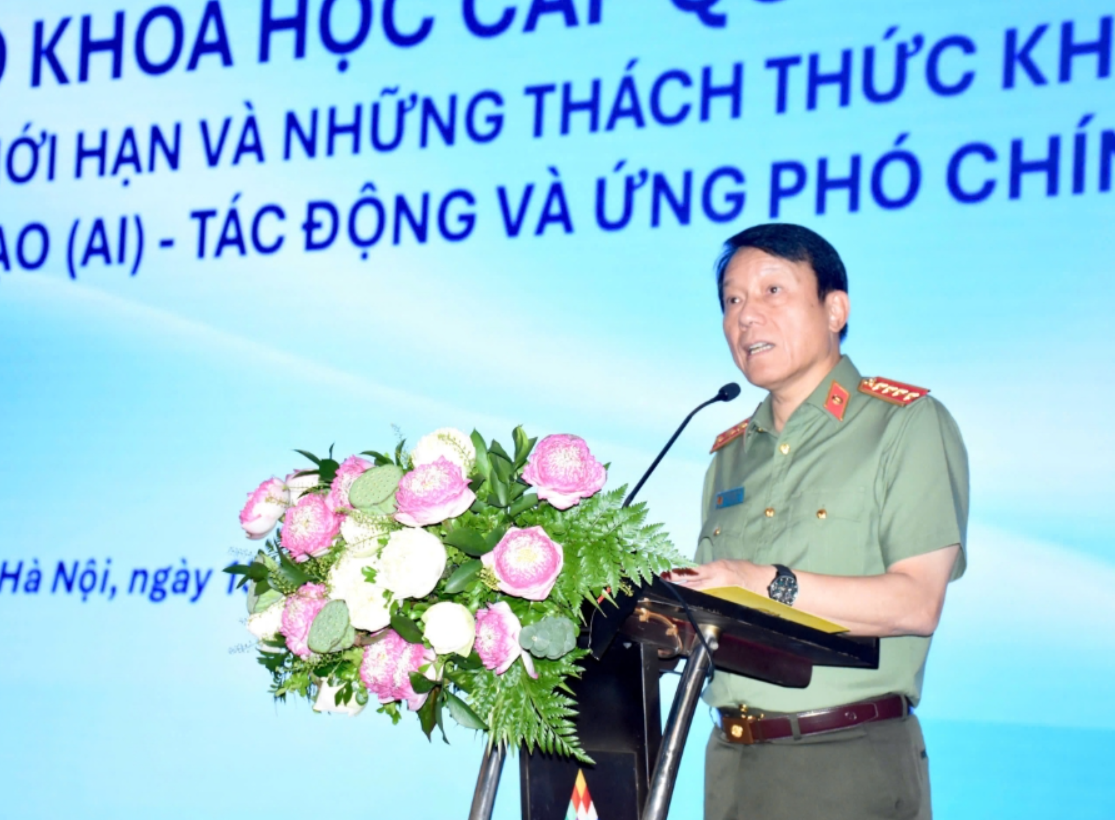AI – New Growth Engine and Challenges for Vietnam
On September 15, 2025, the Ho Chi Minh National Academy of Politics, in collaboration with the Ministry of Public Security, Ministry of National Defense, Central Theoretical Council, and the Ministry of Science and Technology, held a scientific conference on the impacts of AI and policy responses. At the event, Minister of Public Security Luong Tam Quang emphasized that Resolution 57 identifies science, technology, innovation, and national digital transformation as the “golden key” for Vietnam to escape the middle-income trap and reach developed-country status by the mid-21st century. Among strategic technologies, AI is considered a leading breakthrough, driving innovation in governance, productivity, and socio-economic growth.

Forecasts suggest that by 2030, AI could contribute up to USD 79.3 billion, equivalent to 12% of Vietnam’s GDP. The country now has hundreds of AI startups, ranking second in Southeast Asia, with 75% of businesses already applying AI in sales operations. Several major corporations have also identified AI as central to long-term competitiveness.
However, these achievements are only initial steps. Minister Quang stressed that Vietnam must address “dual challenges”: balancing development with control, innovation with discipline, integration with autonomy. This requires a long-term, comprehensive, and synchronized strategy – from legislation and infrastructure to human resources and clear national AI positioning.
From a theoretical perspective, Professor Nguyen Xuan Thang – Director of the Ho Chi Minh National Academy of Politics and Chairman of the Central Theoretical Council – noted that AI is not only reshaping labor and economic models but also influencing social structures and cultural values. AI carries “near limitless” power, becoming a new productive force in the digital age. Yet, its rapid development raises concerns: potential technological monopolies, widening inequality between nations, and even threats to long-standing humanistic values.
According to the Oxford Insights AI Readiness Index, Vietnam ranked 51st out of 188 in 2024, 9th in East Asia, and 5th in ASEAN. The government has adopted a National AI Strategy through 2030 with a vision to 2045, aiming to place Vietnam among the world’s top 10 countries in AI application. The country has also invested in AI training from undergraduate to postgraduate levels, partnered with international organizations, and built laboratories and research centers.
Still, as Nguyen Xuan Thang pointed out, Vietnam faces major gaps: a shortage of AI experts, training programs misaligned with business needs, weak computational infrastructure, underdeveloped semiconductor industry, and limited R&D funding. More critically, the legal framework for AI remains fragmented, with no dedicated AI law and insufficient safeguards for data privacy and national security.
In a world of accelerating AI competition, these limitations hinder Vietnam’s ability to produce AI products of global scale. To unlock AI’s full potential, coordinated efforts across the entire ecosystem are required – from state policy to enterprise implementation, academic research, and social engagement. Sustainable AI development must be grounded in responsibility, ethics, and a clear human-centered vision.
Ý kiến bạn đọc
Những tin mới hơn
Những tin cũ hơn
Nguyễn Thị Kim Hường: Người thầm lặng kiến tạo giá trị, vững bước cùng Luật Nguyễn
Trong bất kỳ tổ chức nào, bên cạnh những người trực tiếp "ra trận" tạo nên doanh thu, còn có những "kiến trúc sư thầm lặng" xây dựng nên nền móng vững chắc. Tại Luật Nguyễn, người ta thường nhắc đến những luật sư dày dạn kinh nghiệm, nhưng ít ai biết về Nguyễn Thị Kim Hường – một trong những...
-
 NHNN Quyết Liệt "Ra Tay" Kiểm Soát Thị Trường Đôla "Chợ Đen" Trước Mức Chênh Lệch Kỷ Lục
NHNN Quyết Liệt "Ra Tay" Kiểm Soát Thị Trường Đôla "Chợ Đen" Trước Mức Chênh Lệch Kỷ Lục
-
 Lái Xe Khi Chỉ Có Giấy Hẹn GPLX Hết Hạn: Liệu Có Hợp Pháp?
Lái Xe Khi Chỉ Có Giấy Hẹn GPLX Hết Hạn: Liệu Có Hợp Pháp?
-
 Cảnh Báo Quan Trọng: Hộ Chiếu Việt Nam Hết Hiệu Lực Ngay Khi Có Quyết Định Thôi Quốc Tịch
Cảnh Báo Quan Trọng: Hộ Chiếu Việt Nam Hết Hiệu Lực Ngay Khi Có Quyết Định Thôi Quốc Tịch
-
 Tại sao DN và cá nhân cần dịch vụ tư vấn thuế chuyên nghiệp?
Tại sao DN và cá nhân cần dịch vụ tư vấn thuế chuyên nghiệp?
-
 "Đầu cơ ôm 10 căn, sao giá nhà giảm được?": Sốt đất Hà Nội chạm mức kỷ lục, Bộ Xây dựng tung giải pháp siết tín dụng
"Đầu cơ ôm 10 căn, sao giá nhà giảm được?": Sốt đất Hà Nội chạm mức kỷ lục, Bộ Xây dựng tung giải pháp siết tín dụng
- Đang truy cập168
- Hôm nay24,869
- Tháng hiện tại91,649
- Tổng lượt truy cập2,835,767
-
 Cập nhật địa chỉ trụ sở Công an cấp xã tại TPHCM sau sáp nhập
Cập nhật địa chỉ trụ sở Công an cấp xã tại TPHCM sau sáp nhập
-
 Thông tư 40/2021 :Quy định về nghĩa vụ thuế đối với hộ kinh doanh
Thông tư 40/2021 :Quy định về nghĩa vụ thuế đối với hộ kinh doanh
-
 Địa chỉ 19 Tòa án nhân dân (TAND) khu vực TP.HCM sau sáp nhập
Địa chỉ 19 Tòa án nhân dân (TAND) khu vực TP.HCM sau sáp nhập
-
 Ngân 98 và lời khai trong vụ án sản xuất, buôn bán thực phẩm giả
Ngân 98 và lời khai trong vụ án sản xuất, buôn bán thực phẩm giả
-
 Hóa đơn GTGT xuất cho khách cá nhân có bắt buộc ghi CCCD?
Hóa đơn GTGT xuất cho khách cá nhân có bắt buộc ghi CCCD?








